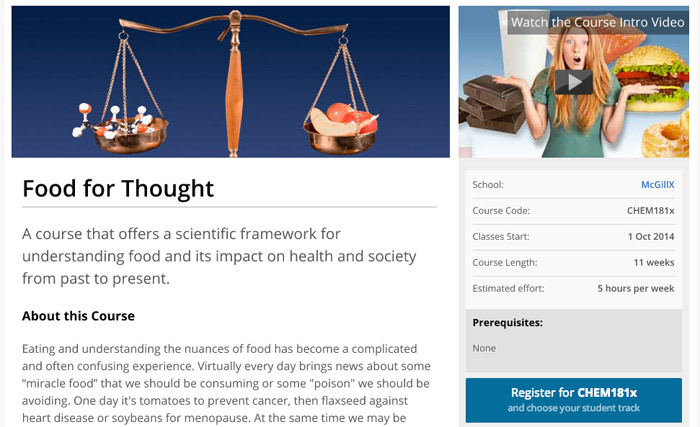Last Wednesday McGill relaunched a Massive Open Online Course (MOOC), Food For Thought, on the website EdX, a popular online learning platform. The course, led by McGill professors David N. Harpp, Joe Schwarcz, and Ariel Fenster, debuted to 7,663 students from 158 countries as of Oct. 1.
Food for Thought is based on the popular McGill course CHEM181, (World of Chemistry), which has been a mainstay at the university since 1982. Introduced last year as McGill’s first MOOC, the online course finished with a 4.96 rating out of five, with 1,764 students completing the course in its entirety.
“The feedback was off the charts, frankly,” Harpp said. “I was a little surprised that it came up as good as it did. I thought that maybe they would say, ‘Harpp mumbles a lot, Schwarcz talks too fast,’ or something like that. There was in fact none of that, which was also a surprise. We didn’t feel that we need to change [the course] very much.”
Frank Roop, the McGill video producer for the EdX series, stated that the team’s immense preparation for the course the first time around allowed them to re-use material for the second iteration of Food for Thought.
“There was a tremendous amount of preparation done for the first [course],” Roop said. “All the slides were revamped, updated [with] new pictures, [and] copyright cleared—which is a huge aspect of it. But once that was done, and because most of the material is timeless in terms of it wasn’t dated for that year, we were able to repurpose it for this year.”
Online courses differ in format from in-person ones, but most feature lectures, readings, homework, and assignments—similar to many classes offered on-campus. However, due to the nature of the courses, there are differences in quality between MOOCs and on-campus classes, according to Teaching and Learning Services’ Alexander Steeves-Fuentes.
“[Videos] are a lot better quality,” he said. “There’s no comparison [….] The videos we produce are done in a studio. We have a professional videographer [who] does all the editing.”
According to Steeves-Fuentes, hosting Food For Thought on EdX last year has already changed the way its on-campus counterpart is being run.
“On a small scale, if you just refer to CHEM181 […] when they offered their course last semester, it was using all the new visuals they had [from the MOOC],” he said. “When they offer it in the future, it’ll be even better in some respects.”
Funding for the course is not provided by the university, and is instead provided by private donors. According to Steeves-Fuentes, who is also the online course development assistant for the EdX courses, MOOCs offer little in terms of monetary incentives.
“No one’s going to make money off of MOOCs,” he said, “They’re expensive. It’s not straightforward to develop and offer something in that kind of style and environment.”
McGill is currently developing two new MOOCs—Learning For Social Impact and Body101—and will be offering Natural Disasters (ATOC185) this coming January.
According to Harpp, it is crucial that McGill continues to develop and support MOOCs, in order to globally compete with other leading institutions.
“I think it shows that the university is interested in the public domain,” Harpp said. “I think what we do is a service to the community [….] I think we’re learning a little more about how students appreciate courses, and how they interact in courses. And we have made this one considerably more interactive than we were ever able to do on campus.”








